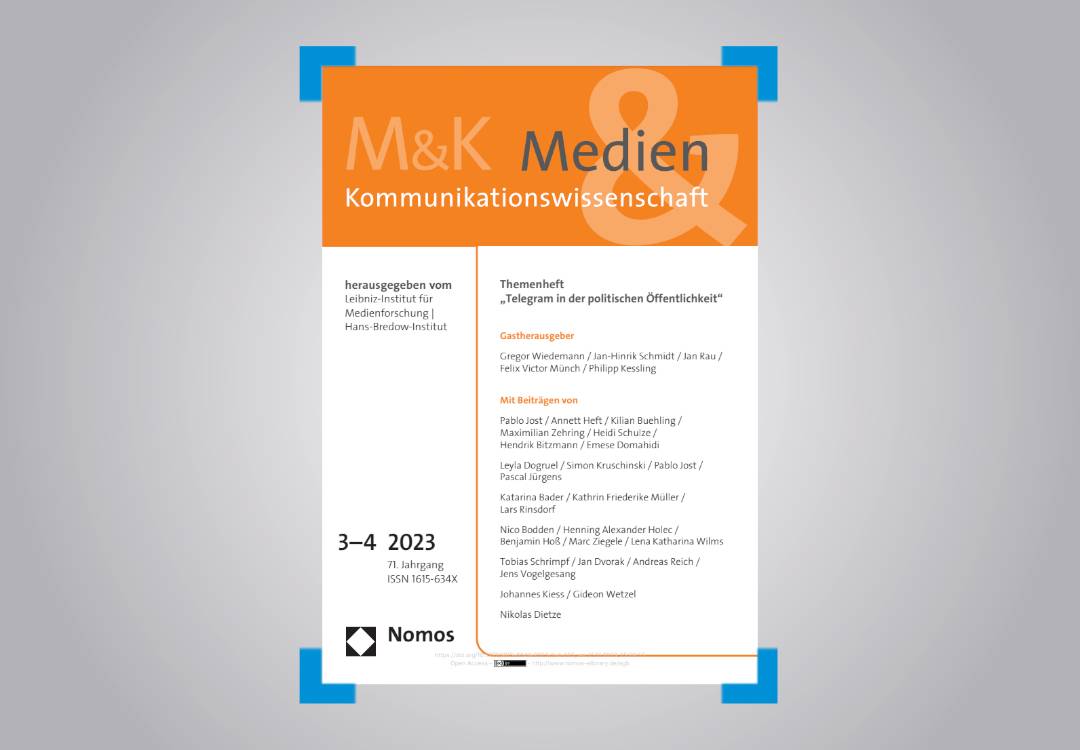Our journal Medien & Kommunikationswissenschaft (M&K) focuses on the messenger service Telegram in its current issue 3-4/2023. It was edited by HBI researchers Gregor Wiedemann, Jan-Hinrik Schmidt, Jan Rau, Felix Victor Münch and Philipp Kessling. The entire issue and all other M&K issues from the year 2000 onwards are available as open access in the Nomos-Verlag eLibrary.
To issue 3-4/2023
Telegram in the Political Public Sphere
Telegram has become an attractive communication platform for actors on the far right. In Germany, Telegram became very popular at the start of the coronavirus pandemic, with users ranging from critics of coronavirus policy and supporters of conspiracy narratives to openly right-wing extremists. Civil society organizations warn that Telegram contributes significantly to the polarization of the political public sphere. Even though several Telegram studies have now been published, the research situation for Germany is still quite limited. This special issue provides a comprehensive overview of the findings on Telegram with a focus on German-speaking countries.
All seven articles in this issue share the observation that the growth of Telegram users is closely linked to radical, conspiracy-theoretical, and extreme right-wing political scenes as well as the deplatforming of actors from these scenes from mainstream platforms such as Facebook and Twitter. The contributions focus on different aspects, such as regional aspects (e.g. local Telegram actors in Saxony) or specific movement actors (e.g. lateral thinking or the extreme right). Methodologically, the contributions combine methods from computational social science (CSS), such as automatic content analysis and network analysis, with established methods, such as surveys and qualitative content analysis or expert interviews.
All in all, the articles in this special issue, in which an encouraging number of young researchers have also contributed, illustrate how important it is for research to react quickly to the extremely dynamic developments in the field of public communication via digital platforms. At the same time, our editors note that many of the questions raised in the Call for Papers remain unanswered. The currently highly regarded fields of research such as conspiracy theories, social polarization or the extreme right on Telegram are undoubtedly relevant, but we still know little about the significance of the service for the communication of the political public beyond these social danger zones. The position of Telegram in relation to other platforms and its embedding in a cross-platform ecosystem of digital social communication is also still insufficiently explored.
Content
Gregor Wiedemann / Jan-Hinrik Schmidt / Jan Rau / Felix Victor Münch / Philipp Kessling
Telegram in der politischen Öffentlichkeit. Zur Einführung in das Themenheft [Telegram in the Political Public Sphere. Introduction to the Special Issue]
Pablo Jost / Annett Heft / Kilian Buehling / Maximilian Zehring / Heidi Schulze / Hendrik Bitzmann / Emese Domahidi
Mapping a Dark Space: Challenges in Sampling and Classifying Non-Institutionalized Actors on Telegram
Leyla Dogruel / Simon Kruschinski / Pablo Jost / Pascal Jürgens
Distribution and Reception of Conspiracy Theories and Mobilization Calls on Telegram. Combining Evidence from a Content Analysis and Survey During the Pandemic
Katarina Bader / Kathrin Friederike Müller / Lars Rinsdorf
Zwischen Staatsskepsis und Verschwörungsmythen. Eine Figurationsanalyse zur kommunikativen Konstruktion von Gegenöffentlichkeiten auf Telegram [Between State Skepticism and Conspiracy Myths. A Figuration Analysis of the Communicative Construction of Counter-Publics on Telegram]
Nico Bodden / Henning Alexander Holec / Benjamin Hoß / Marc Ziegele / Lena Katharina Wilms
Vom Netz genommen. Die Auswirkungen von Deplatforming auf die Online-Kommunikation der extremen Rechten auf Telegram am Beispiel der Identitären Bewegung [Pulled from the Internet. The Effects of Deplatforming on the Online Communication of the Extreme Right on Telegram Using the Example of the Identitarian Movement]
Tobias Schrimpf / Jan Dvorak / Andreas Reich / Jens Vogelgesang
Aus dem Channel, auf die Straße! Wie die Querdenken-Bewegung ihren Protest auf Telegram organisiert – eine quantitative Netzwerkanalyse [Out of the Channel, onto the Street! How the Querdenken Movement Organizes its Protest on Telegram - a Quantitative Network Analysis]
Johannes Kiess / Gideon Wetzel
Die extrem rechte und verschwörungsideologische Telegram-Szene in Sachsen. Angebot und Nachfrage einer lokal eingebetteten Bewegung [The Extreme Right and Conspiracy Ideology Telegram Scene in Saxony. Supply and Demand of a Locally Embedded Movement]
Nikolas Dietze
Digitaler Raum(-öffner) – Lokaler Rechtsextremismus und Telegram [Digital Space(-opener) - Local Right-Wing Extremism and Telegram]
LITERATURE
Reviews
Katrin Schlör
Rudolf Kammerl / Claudia Lampert / Jane Müller (Hrsg.) (2022): Sozialisation in einer sich wandelnden Medienumgebung. Zur Rolle der kommunikativen Figuration Familie. Baden-Baden: Nomos
Gerhard Vowe
Jürgen Kaube / André Kieserling (2022): Die gespaltene Gesellschaft. Berlin: Rowohlt
Stefan Wallaschek
Anne Kurr (2022): Verteilungsfragen. Wahrnehmung und Wissen von Reichtum in der Bundesrepublik (1960–1990). Frankfurt a. M.: Campus Verlag
Yulia Yurtaeva-Martens
Friederike Oberkrome / Lotte Schüßler (Hrsg.) (2023): Arbeiten zwischen Medien und Künsten. Feministische Perspektiven auf die erste Hälfte des 20. Jahrhunderts. Berlin: Neofelis
Jan Rau
Lisa Schwaiger (2022): Gegen die Öffentlichkeit. Alternative Nachrichtenmedien im deutschsprachigen Raum. Bielefeld: transcript
Andreas Schulz-Tomančok
Christian Strippel / Sünje Paasch-Colberg / Martin Emmer / Joachim Trebbe (Hrsg.) (2023): Challenges and Perspectives of Hate Speech Research. Berlin: Böhland & Schremmer
Thomas Birkner
Niklas Venema (2023): Das Volontariat. Eine Geschichte des Journalismus als Auseinandersetzung um seine Ausbildung (1870–1990). Köln: Halem
List of relevent literature
Dissertation overview
(Hamburg, 17 November 2023)


